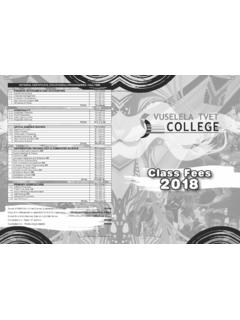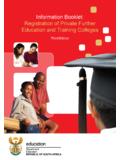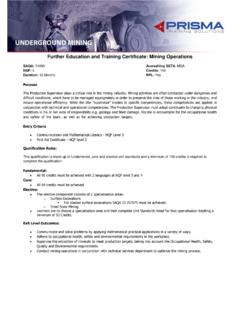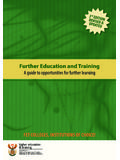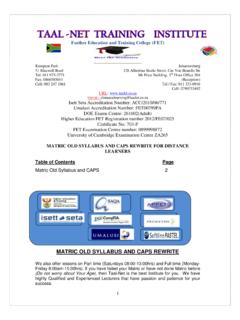Transcription of GUIDELINES FOR THE ADMINISTRATION AND …
1 GUIDELINES FOR THE ADMINISTRATION AND MANAGEMENT OF THE DEPARTMENT OF HIGHER education AND training (DHET) further education AND training (FET) COLLEGE BURSARY SCHEME Opening the doors of learning is as important today as it was when the Freedom Charter was written . Dr Blade Nzimande, Minister of Higher education and training (Green Paper on Post-School education and training ) 2 TABLE OF CONTENTS 1. Purpose .. 4 2. Policy and Legal Context .. 4 3. Bursary Funds Allocation Criteria to Colleges .. 6 4. Criteria for Awarding of Bursaries to Students ..7 5. Bursary ADMINISTRATION Process .. 12 6. Bursary ADMINISTRATION Schedule .. 14 7. Additional College Responsibilities .. 16 8. Checklist for FET Colleges Bursary ADMINISTRATION .. 17 9. Monitoring and Support .. 18 10. Marketing .. 19 3 ACRONYMS a) DHET: Department of Higher education and training b) FAC: Financial Aid Committee c) FAL: First Additional Language d) FAO: Financial Aid Officer e) FET: further education and training f) FTE: Full time equivalent g) ID: South African Identity Document h) NC(V): National Certificate (Vocational) i) NQF: National Qualifications Framework j) NSC: National Senior Certificate k) NSDS III: National Skills Development Strategy III l) NSFAS: National Student Financial Aid Scheme m) NSF-FET Colleges: National Norms and Standards for Funding further education and training Colleges n) PDE: Provincial Departments of education o) Report 191: National education Policy, formal Technical Colleges Instructional Programmes in the RSA p) SoP: Schedule of Particulars q) SRC: Student Representative Council r) SSS.
2 Student Support Services s) Umalusi: Council for Quality Assurance in General and further education and training 4 PURPOSE The purpose of this document is to provide Colleges with the GUIDELINES for the ADMINISTRATION , management and awarding of bursaries to FET College students. POLICY AND LEGAL CONTEXT These GUIDELINES have been developed in accordance with the National Norms and Standards for Funding further education and training Colleges (NSF-FET Colleges) . In terms of the FET Colleges Act, 2006, the Minister of Higher education and training must determine policy on the norms and standards for funding FET Colleges. To this effect, in 2009, the Minister promulgated the National Norms and Standards for funding FET Colleges, hereafter referred to as the NSF-FET Colleges . 1. In terms of the NSF-FET Colleges, each student enrolled in a state-funded programme must be subsidised by the state at 80% of the total programme cost.
3 The difference of 20% of the total programme costs, which constitute College fees, must be recovered from the student. 2. In order to ensure that College fees do not constitute a barrier to access to state-funded programmes, paragraph 73 of the NSF-FET Colleges, and paragraph of the National Plan for further education and training Colleges in South Africa, 2008; state that the Government shall introduce an FET College bursary scheme. This is to ensure that academically deserving and yet financially needy students gain access to education and training opportunities in FET Colleges. The bursary amount covers the 20% portion of student fees which the academically deserving and financially needy students need not pay. 3. Paragraph 73 of the NSF-FET Colleges and paragraph of the National Plan for further education and training Colleges in South Africa, 2008 further requires the Department to 5 develop GUIDELINES for the ADMINISTRATION and management of the FET College Bursary Scheme.
4 This document must therefore be understood against this policy injunction. 4. To gain a comprehensive understanding of the legal and the policy framework that underpins the FET College Bursary Scheme, these GUIDELINES must be read in conjunction with: a) National Student Financial Aid Scheme Act, 1999; b) further education and training Colleges Act, 2006; c) The National Plan for further education and training Colleges in South Africa, 2008; d) National Norms and Standards for further education and training Colleges, 2009; e) The extension of phasing out of the National N Certificates: N1 N3 (Engineering Studies), Government Gazette No. 33793; f) The extension of the offering of National N Certificates: N4 N6, Government Gazette No. 33794; and g) Approval of the policy document Formal FET Colleges programmes at Levels 2 to 4 of the NQF, Government Gazette No.
5 33795. These GUIDELINES should be read in conjunction with and with due consideration of the NSFAS GUIDELINES 5. Pursuant to the commitment made in the policy and legislation cited above, in 2007, for the first time in the history of FET Colleges, a bursary scheme was introduced as a means to create access to priority vocational programmes offered at FET Colleges. 6. In December 2010, the Minister of Higher education and training , Dr Blade Nzimande, approved policies which extended the provision of the Report 191 programmes (refer to paragraph 4(e) to 4(g) for the policies). 7. Reference made in the National Norms and Standards for further education and training Colleges, 2009 and The National Plan for further education and training Colleges in South Africa, 2008 to State funded programmes therefore includes Report 191 programmes, 6 and the provision of the FET College Bursary Scheme to Report 191 students came into effect from January 2011.
6 8. The provision of student financial aid is critical for enabling access to FET Colleges. The role of FET Colleges as the nucleus of skills development in South Africa is explicitly contained in the NSDS III unveiled in January 2011 by Minister Nzimande. The challenge of access for academically deserving students from poor backgrounds is addressed by the bursary scheme. 9. The permissible bursary awards are updated annually. Refer to paragraph 13 and the programme costs of the current academic year. Programme costs for the following year will be sent separately to Colleges before the end of September of each year. BURSARY FUNDS ALLOCATION CRITERIA TO COLLEGES 10. The Department allocates bursary funds to Colleges on an annual basis taking the following into consideration: a) Programme costs in accordance with the NSF-FET Colleges; b) DHET approved actual National Certificate (Vocational) NC(V) and Report 191 enrolments; c) NC(V) and Report 191 programmes students academic performance and retention rates; d) College fees; and e) Available funding.
7 11. Accurate and fair distribution of the bursary funds is of paramount importance. These principles are applied to the enrolment figures finalized by the end of February of each year. 7 CRITERIA FOR AWARDING OF BURSARIES TO STUDENTS 12. Colleges are required to use the criteria below when awarding bursaries to students: a) Students must be enrolled or intending to enroll for the NC(V) OR Report 191 programmes for the bursary to be awarded; b) The financial need of the student must be assessed using the NSFAS Means Test tool of each academic year when awarding bursaries to students. The ADMINISTRATION of the Means Test is compulsory and evidence of such ADMINISTRATION must be retained at the College for audit purposes; c) The bursaries should be awarded against an approved and signed agreement between NSFAS and the student this agreement is referred to as the Schedule of Particulars (SoP).
8 It is important to note that only the students who have been awarded bursaries are required to sign the SoP; d) For new NC(V) Level 2 and Report 191 (N1 and N4) students, academic criteria must be applied using the school report from the preceding year and the selection and placement tool results. The College Financial Aid Committee must review documented evidence of satisfactory academic performance in awarding bursaries to students enrolling in Level 2 and N1 and N4 programmes. The minimum standard must be determined by the Financial Aid Committee and approved by the College Principal. e) Applicants who were awarded bursaries for NC(V) Levels 2 and 3 in the previous year, and who have performed well academically in the previous academic year, and are therefore progressing to the next Level, should be prioritised for bursaries for NC(V) Level 3 and Level 4 in the current year.
9 Similarly applicants who were awarded bursaries for Report 191 N1 to N5 in the previous semester/trimester, and who have performed well academically in the previous semester/trimester, and are therefore progressing to the next N level, should be prioritized for bursaries for Report 191 N2 to 8 N6 in the current semester/trimester. In respect of prioritizing eligible students for the awarding of bursaries, Colleges must take into account their policy on student progression; f) The granting of a bursary in the current academic year (for students who were granted bursaries in the previous academic year) is subject to the student s financial situation not having improved. The student will have to provide evidence thereof and complete all required forms; g) NC(V) Level 2, Level 3 and Level 4 students who were awarded bursaries in the previous academic year and who did not progress to NC(V) Level 3 and Level 4 respectively, cannot be awarded bursaries to repeat NC(V) Level 2, or Level 3; h) Students may be awarded bursaries up to a maximum of four years for the NC(V) programme.
10 The fourth year bursary should be awarded only in the fourth year of study (after Level 4) to allow students to complete any outstanding subjects. This provision is only applicable to continuous study. No bursaries should be awarded in the fifth year of study; i) On application, Report 191 programme students may apply for all semester or trimester courses in the calendar year of study. Bursaries for the next level of study will only be granted on successful completion of at least 3 subjects in each study level of the Report 191 programmes; j) Report 191 students may also be awarded bursaries if they have successfully completed N3 and N6 and have outstanding subjects for full certification. This provision is made for a period of six months for Engineering, Non-Engineering and Business Studies respectively and is applicable to continuous study which will be paid at pro-rata, proportional to 6 months; k) Where bursaries are awarded for outstanding subjects only, the costs per subject should be calculated as follows: 9 NC(V) cost per subject: Programme cost (20% which is the student College fee) divided by 7.








